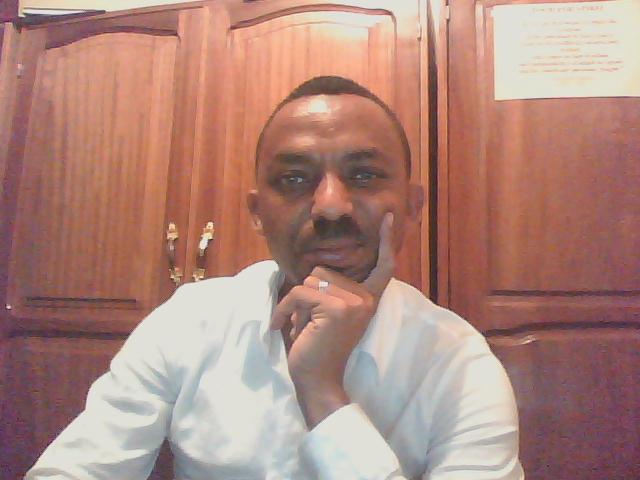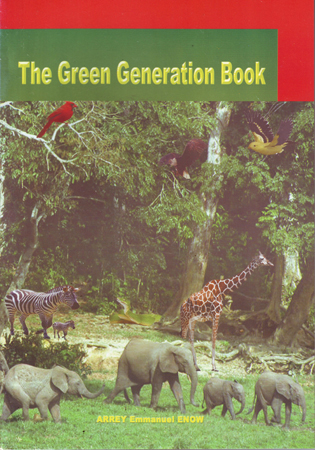Arrey Emmanuel Enow
 Arrey Emmanuel Enow was born in Mondoni South West region of Cameroon.
Arrey Emmanuel Enow was born in Mondoni South West region of Cameroon.
He attended Government High School Limbe, Imperial Academy of Arts, Science and Technology Tiko, University of Dschang and the University of Yaounde I. He holds a BA in Psychology, a Diploma in Management and Marketing; Certificate of course completion MDG 5, Youth involvement in democratic process, Training of trainers on human right and Sustainable approach to malaria control.
He is the Interim Director of the Last Great Ape Organization (LAGA) an international NGO on wildlife law enforcement, the secretary general of Action for Citizen and Community Development (ACCOD), Communication Officer of the Mobile Unit for Psychosocial Support (DIAP), Delegate in charge of education 3A Chantal Biya Foundation and Online volunteer with TIG Panorama Editing team.
He is an activist, he encourage Advocacy for HIV/AIDS, sexual and reproductive health, environment and human rights and had served as the project coordinator of University of Dschang Alumni, chairman of the Model African Union Committee, President of Better world Student nature club and Assistant HIV/AIDS project coordinator of the Cameroon Center for the protection and education of the child (CAPEC).
Writings and Interviews
Reuters-Cameroon may lose all doctors by 2009
Culture of Peace-Poem 'Come Now Peace'
Pre- and in-service training: Questions for Discussion
Teachers and HIV prevention: Questions for Discussion
Topic 2: Capitalising the synergies between AIDS, Health ...
Send a letter to the Health MInister! End Forced Sterilisation
AIDS Free Generation-AIDS Free Generation
Advocates for Youths
The Green Generation Workbook

Preface
The planet's natural ecosystems are being severely degraded and, as a result, this compromises the ability of the planet to sustain life. Forests, fisheries, oceans, rangeland, fresh water systems and other natural ecosystems are all threatened while many are on the verge of collapse. Water, land and air are getting increasingly polluted, water tables are falling, soil erosion is leading to desertification, global warming is well underway, and species are dying out 1000 times faster than their natural rate of extinction. Humanity has the ability to make development sustainable and to ensure that it meets the needs of the present without compromising the ability of future generations to meet their own needs. But there is a great challenge in changing long time habits and approaches for us to reverse destruction.
Environmental education must play a major role in rectifying this shortsighted and separatist view of humanity and nature. By making students more aware of the adverse effects of their lifestyle and actions, environmental education can help students understand their personal responsibility to earth. Environmental education can help us to understand the need to be spiritually connected with each other, as well as with nonhuman life forms and the understanding that humans are subject to the same laws of nature as other living things. This generation of young people and the next generation to follow will have to solve a lot of environmental problems. We are facing one of the largest collective action problems humanity has ever faced, and we need to give students the skills to solve them.
But so far, environmental education has failed to keep pace with environmental degradation. Arrey Emmanuel Enow offers the first of its kind effort to educate the new generation on the different contemporary aspects of the environmental crisis, as well as foster a sense of responsibility to protect our planet.
It is an introduction to burning environmental concerns and ecological friendly actions that can sustain the environment for future generations. It is envisaged that those who study with this book will become aware of the devastating consequences of their actions on earth, and, become more environmentally friendly. Ignorance and greed are the driving forces behind environmental degradation. This book is set to instill better values on which a society can be based and assimilate the protection of one’s surrounding to patriotism.
This book is therefore not limited to schools only. It is directed at all children irrespective of their backgrounds. It is envisaged that if they are taught about the environment and how to use it in a sustainable manner, they will better know how to manage it properly for posterity. These eco-friendly approaches will, therefore, help them avoid falling into the same trap, which our generation got themselves into on the first place.
This important book will no doubt raise awareness to environmental issues but its real importance is in laying a new vision to the Cameroonian society and its education system - a new vision for a green generation.
Ofir Drori
